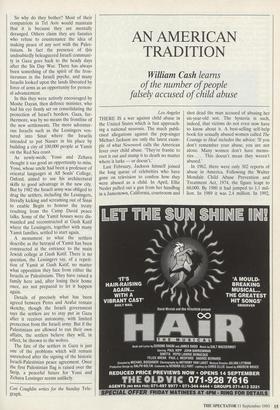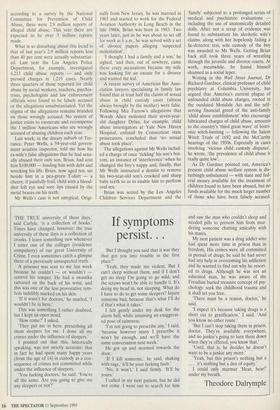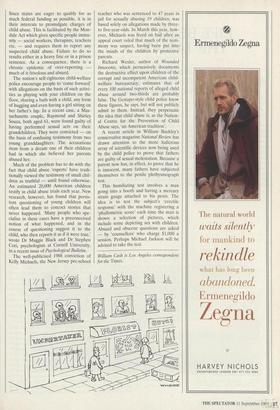AN AMERICAN TRADITION
William Cash learns
of the number of people falsely accused of child abuse
Los Angeles THERE IS a war against child abuse in the United States which is fast approach- ing a national neurosis. The much publi- cised allegations against the pop-singer Michael Jackson are only the latest exam- ple of what Newsweek calls the American fever over child abuse. 'They're frantic to root it out and stamp it to death no matter where it lurks — or doesn't.'
Last February, Jackson himself joined the long queue of celebrities who have gone on television to confess how they were abused as a child. In April, Ellie Nesler pulled out a gun from her handbag in a Jamestown, California, courtroom and shot dead the man accused of abusing her six-year-old son. The hysteria is such, indeed, that victims do not even now have to know about it. A best-selling self-help book for sexually abused women called The Courage to Heal includes the advice: 'If you don't remember your abuse, you are not alone. Many women don't have memo- ries . . . This doesn't mean they weren't abused.'
In 1962, there were only 302 reports of abuse in America. Following the Walter Mondale Child Abuse Prevention and Treatment Act, 1974, the figure leapt to 60,000. By 1980 it had jumped to 1.1 mil- lion. In 1989 it was 2.4 million. In 1992, according to a survey by the National Committee for Prevention of Child Abuse, there were 2.9 million reports of alleged child abuse. This year there are expected to be over 3 million reports made.
What is so disturbing about this trend is that of last year's 2.9 million reports less than 40 per cent were actually substantiat- ed. Last year the Los Angeles Police Department, for example, investigated 4,213 child abuse reports — and only pressed charges in 1,219 cases. Nearly three quarters of those reported for child abuse by social workers, teachers, psychia- trists, psychologists and law enforcement officials were found to be falsely accused or the allegations unsubstantiated. Yet the stigma of the allegations remains branded on those wrongly accused. No system of justice exists to exonerate and recompense the 1 million Americans who are wrongly accused of abusing children each year.
Last week, in the dreary suburb of Tor- rance, Peter Wells, a 59-year-old govern- ment aviation inspector, told me how his ex-wife's false allegations that he had sexu- ally abused their only son, Brian, had cost him $100,000 — loading him with debt and wrecking his life. Brian, now aged ten, sat beside him in a pea-green T-shirt — a cheery, if painfully frail, child with a blood- shot left eye and sore lips caused by the metal braces on his teeth.
Mr Wells's case is not untypical. Origi-
nally from New Jersey, he was married in 1965 and started to work for the Federal Aviation Authority in Long Beach in the late 1960s. Brian was born in 1983. Two years later, just as he was about to set off for work at 6 a.m., he was served with a set of divorce papers alleging 'suspected molestation'.
'I thought I had a family and a son,' he sighed, 'and then, out of nowhere, came these crazy accusations because my wife was looking for an excuse for a divorce and wanted the kid.'
A recent survey of American Bar Asso- ciation lawyers specialising in family law found that at least half the claims of sexual abuse in child custody cases (almost always brought by the mother) were false. Following Mia Farrow's allegations that Woody Allen molested their seven-year- old daughter Dylan, for example, child abuse investigators at Yale New Haven Hospital, enlisted by Connecticut state prosecutors, concluded that 'no sexual abuse took place'.
The allegations against Mr Wells includ- ed a charge of once 'tickling' his son's bot- tom, an instance of 'interference' when he changed the boy's nappy and, finally, that Mr Wells instructed a dentist to remove his two-year-old son's crooked and sharp baby teeth so as to enable him to perform oral sex.
Brian was seized by the Los Angeles Children Services Department and the `family' subjected to a prolonged series of medical and psychiatric evaluations including the use of anatomically detailed dolls. After not a scrap of evidence was found to substantiate his alcoholic wife's claims, along with her hopelessly failing a lie-detector test, sole custody of the boy was awarded to Mr Wells. Getting Brian back still took three years of wrestling through the juvenile and divorce courts. At work, meanwhile, he found himself shunned as a social leper.
Writing in the Wall Street Journal, Dr Richard Gardner, clinical professor of child psychiatry at Columbia University, has argued that America's current plague of unfounded child abuse charges, rooted in the outdated Mondale Act and the self- serving financial greed of the anti-family `child abuse establishment' who encourage fabricated charges of child abuse, amounts to the country's 'third great wave' of histri- onic witch-hunting — following the Salem Witch Trials of 1692 and the McCarthy hearings of the 1950s. Especially in cases involving 'vicious child custody disputes', he wrote, 'the prevalence of child abuse is really quite low'.
As Dr Gardner pointed out, America's present child abuse welfare system is dis- turbingly unbalanced — with state and fed- eral money available for the treatment of children found to have been abused, but no funds available for the much larger number of those who have been falsely accused. Since states are eager to qualify for as much federal funding as possible, it is in their interests to promulgate charges of child abuse. This is facilitated by the Mon- dale Act which gives specific people immu- nity,— social workers, therapists, teachers etc. — and requires them to report any suspected child abuse. Failure to do so results either in a heavy fine or in a prison sentence. As a consequence, there is a chronic epidemic of over-reporting much of it frivolous and absurd.
The nation's self-righteous child-welfare police encourage people to 'come forward' with allegations on the basis of such activi- ties as playing with your children on the floor, sharing a bath with a child, any form of hugging and even having a girl sitting on her father's lap. In a recent case, a Mas- sachusetts couple, Raymond and Shirley Souza, both aged 61, were found guilty of having performed sexual acts on their grandchildren. They were convicted — on the basis of confusing testimony from two young granddaughters. The accusations stem from a dream one of their children had in which she believed her parents abused her.
Much of the problem has to do with the fact that child abuse 'experts' have tradi- tionally viewed the testimony of small chil- dren as truthful — until found otherwise. An estimated 20,000 American children testify in child abuse trials each year. New research, however, has found that persis- tent questioning of young children will often lead them to concoct stories that never happened. 'Many people who spe- cialise in these cases have a preconceived notion of what happened, and in the course of questioning suggest it to the child, who then reports it as if it were true,' wrote Dr Maggie Black and Dr Stephen Cori, psychologists at Cornell University, in a recent issue of Psychological Bulletin.
The well-publicised 1988 conviction of Kelly Michaels, the New Jersey pre-school teacher who was sentenced to 47 years in jail for sexually abusing 19 children, was based solely on allegations made by three- to five-year-olds. In March this year, how- ever, Michaels was freed on bail after an appeal court ruled that much of the testi- mony was suspect, having been put into the minds of the children by protective parents.
Richard Wexler, author of Wounded Innocents, which persuasively documents the destructive effect upon children of the corrupt and incompetent American child- welfare bureaucracy, estimates that of every 100 national reports of alleged child abuse around two-thirds are probably false. The Gestapo-style child police know these figures, he says, but will not publicly admit to them. Instead, they perpetuate the idea that child abuse is, as the Nation- al Centre for the Prevention of Child Abuse says, 'an American tradition'.
A recent article in William Buckley's conservative magazine National Review has drawn attention to the more ludicrous array of scientific devices now being used by the child police to prove that fathers are guilty of sexual molestation. Because a parent now has, in effect, to prove that he is innocent, many fathers have subjected themselves to the penile plethysmograph test.
This humiliating test involves a man going into a booth and having a mercury strain gauge attached to his penis. The idea is to test the subject's 'erectile response' with the machine registering a `phallometric score' each time the man is shown a selection of pictures, which include some depicting sex with children. Absurd and obscene questions are asked — by 'counsellors' who charge $1,000 a session. Perhaps Michael Jackson will be advised to take the test.
William Cash is Los Angeles correspondent for the Times.




















































 Previous page
Previous page